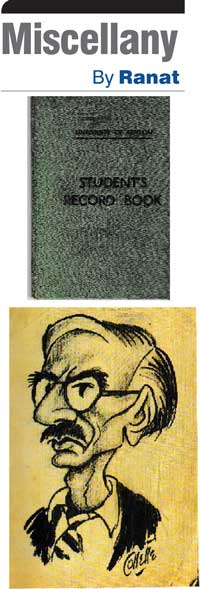Monday Feb 16, 2026
Monday Feb 16, 2026
Saturday, 3 June 2017 00:00 - - {{hitsCtrl.values.hits}}
June remains a memorable month in my life. It was in June 1953 that I entered the Arts Faculty of the University of Ceylon – Peradeniya campus. Though some called it the Peradeniya University, it was not so then. There was only one university with the Arts, Law, Agriculture and Veterinary Science, and Dentistry faculties at Peradeniya. It was a residential campus and all the undergraduates resided in the halls of residence – seven in all (five for males and two for females).
Apart from sweet memories of the three years spent at Jayatilake Hall, the only documents I have kept back are the Student’s Record Book given as we entered, the programme and the degree certificate collected at the Convocation. I can’t remember getting the Students’ Guide but recently I had the opportunity of glancing through one. I wouldn’t know whether such a guide book is given now.
Issued under the signature the Vice-Chancellor, Sir Ivor Jennings, the ‘Student’s Guide to University Education in Ceylon’ had been published in August 1948. Sir Ivor notes in the preface that the guide is intended “to help those who are members or seek to become members of the University of Ceylon”.
He states that the University authorities are anxious to provide university education to as many students as possible, but, he says: “It must be remembered that the number of students depends in large measure on the accommodation, staff and equipment available from time to time and that these in turn depend on the financial provision made by the Government.”
I found Sir Ivor’s explanation on ‘Teaching and Research’ in the Guide quite interesting. He says that the methods of instruction which have to be adopted at school tend to create the impression that “knowledge” consists of a series of propositions whose nature and content are definitely fixed and can be ascertained from the relevant text-books.
Even in the early years of university study the same impression is apt to prevail. The university teacher is however aware that the impression is false. What is known about the universe and especially about humanity is small in proportion to what is unknown; and because it is proportionately so small what is known is rather assumed or guessed at than known. Many of the propositions appearing in text-books are statements not of facts but of opinion. They are convenient working hypothesis whose falsity has not been demonstrated but those whose truth has not been proved.”
Sir Ivor insists that learning is a continuing process which a student follows for the whole of his life. “It does not cease when he ‘graduates’. In fact, the very name implies that he has merely taken a step. There are, as again the name implies, ‘degrees’ of learning. Undergraduates have not even taken the first step; ‘bachelors’ are young men or women who have taken the first step but are still serving an apprenticeship; ‘Masters’ have learned enough to instruct others, but still are really not learned like ‘doctors’; and doctors are still members of the University engaged in the pursuit of knowledge.”
Pointing out that a very learned man may never satisfy any of the formal requirements needed to obtain a ‘degree’, he stresses that some of the most eminent scholars have never attended a university; some of the most learned teachers have never taken masters’ degrees; and some of the ‘doctors’ are not particularly learned. Degrees in the technical sense are not very important, though they are helpful in providing an incentive to students and a rough classification for prospective employers.”
What is more important? According to Sir Ivor, the most learned members of a university are still students, for what they have not learned is still vaster tan what they have learned. Hence arises the tradition of a university graduates and undergraduates, teachers and students, are all fellow-students. They are collected together in pursuit of knowledge, and one of their most important functions is what the University Ordinance calls “the advancement of knowledge” or research, he points out.
Elaborating further, he says that the ‘education’ which consists in receiving propositions doled out by instructors, learning them more or less accurately, and representing them with a sufficient degree of approximation to satisfy the examiners is a depressing and not very useful occupation. Learning in the true sense, seeking to understand the meaning and the sources of ideas, is a stimulating mental exercise.
There are, it is true, stimulating teachers who have mastered what is known about their subjects without attempting to push this knowledge into the unknown, but a university cannot afford to have too many of them, for if it has it loses that contact with the unknown which makes its studies realistic and that energy in the pursuit of knowledge with which the students must be inspired.
Food for thought, indeed.